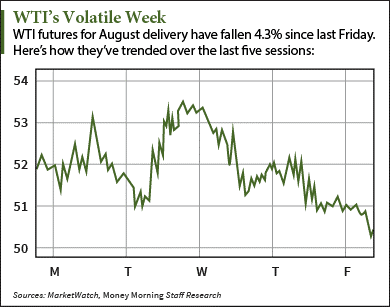 Why the WTI crude oil price is down today, July 17, 2015: The WTI crude oil price today (Friday) is on track to close under $50 for the first time in four months amid bearish sentiment from inventory data and the Iran nuclear deal.
Why the WTI crude oil price is down today, July 17, 2015: The WTI crude oil price today (Friday) is on track to close under $50 for the first time in four months amid bearish sentiment from inventory data and the Iran nuclear deal.
At 11:45 a.m., the WTI crude oil price was down 1.2% to $50.29 a barrel. Yesterday, the U.S. benchmark closed at $50.91, its lowest settlement since March 19. It has tumbled 15.4% so far in July.
The Brent crude oil price was performing slightly better this morning. The international benchmark dropped just 0.33% to $56.72 a barrel. It's down 11.6% this month.
Here's a breakdown of why the WTI crude oil price is down today...
Two Reasons Why the WTI Crude Oil Price Is Down Today
The first reason why the WTI crude oil price is down today is supply numbers.
Energy data provider Genscape reported yesterday that oil supplies in Cushing, Okla. - the central storage hub and delivery point for U.S. oil contracts - increased by nearly 1 million barrels between July 10 and July 14. Those numbers seem to be weighing more heavily on investors' minds than the U.S. Energy Information Administration's (EIA) numbers. The EIA reported a 4.3 million barrel drop in crude supplies last week.
Oil prices are also falling as investors expect increased exports from Iran after a nuclear deal was reached on Tuesday. According to the terms of the agreement, Iran will be allowed to start ramping up oil exports in exchange for the country scaling back its nuclear weapons program.
Investors fear the country's new exports will flood the already oversupplied market with more oil, thus lowering prices even further.
But Money Morning Global Energy Strategist Dr. Kent Moors says the Iran nuclear deal won't drive oil prices down because of one huge reason...
Why the WTI Crude Oil Price Won't Be Affected by the Iran Nuclear Deal
Oil will keep rebounding without any long-term drawbacks from the Iran nuclear deal. That's because it will take at least 18 months for Iran's oil to hit the market. Global oil prices will have fully stabilized by then.
You see, Iran has to pass numerous International Atomic Energy Agency (IAEA) inspections before shipping any more oil. These inspections will ensure that Iran is following the deal by reducing its uranium research and nuclear activity.
But Iran doesn't agree with the inspections and claims that IAEA inspectors are spies working for Iran's enemies. The country's stern attitude will result in delayed inspections and delayed oil exports.
"The biggest reality of all is in the hands of the West," Moors said in early July. "There will certainly be benchmark requirements in place that Iran will have to meet and verify before any oil is exported. So the relaxing of sanctions will occur over time."
[epom key="ddec3ef33420ef7c9964a4695c349764" redirect="" sourceid="" imported="false"]
Meanwhile, Iran simply won't have the infrastructure to become a competitive export player. Since it's only been exporting around 1.2 million barrels a day for years now, it needs more outside support in the form of technology to boost its output.
Considering the country's trust issues, it won't find help from other countries anytime soon.
"Iran doesn't know who to trust, so they don't trust anyone," Moors noted. "The Iranian infrastructure is disastrous and it's going to take a while to rebuild. Some of that they can't do without significant outside support."
The Iran nuclear deal is affecting more than just oil prices. If the deal goes into effect, there will be huge waves of investments pouring into oil companies looking to operate there immediately.
In fact, the Congressional Research Service projects Iran's energy sector will see more than $130 billion in investments by 2020. And there are several oil majors that will benefit most from this coming wave of capital...
Don't miss a single update on the Iran nuclear deal - follow us on Twitter at @AlexMcGuire92 and @moneymorning.


